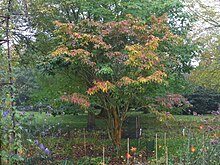| Neoshirakia | |
|---|---|

| |
| Conservation status | |
 Least Concern (IUCN 3.1) | |
| Scientific classification | |
| Kingdom: | Plantae |
| Clade: | Tracheophytes |
| Clade: | Angiosperms |
| Clade: | Eudicots |
| Clade: | Rosids |
| Order: | Malpighiales |
| Family: | Euphorbiaceae |
| Subfamily: | Euphorbioideae |
| Tribe: | Hippomaneae |
| Subtribe: | Hippomaninae |
| Genus: | Neoshirakia Esser |
| Species: | N. japonica |
| Binomial name | |
| Neoshirakia japonica (Siebold & Zucc.) Esser | |
| Synonyms | |
| |
Neoshirakia, known as milktree, is a genus of plants in the Euphorbiaceae, native to east Asia. It is part of a group first described in 1954 with the name Shirakia, but this proved to be an illegitimate name, unacceptable under the Code of Nomenclature. The genus was later divided, with its species distributed amongst three genera: Neoshirakia, Shirakiopsis , and Triadica. Neoshirakia contains only one known species, Neoshirakia japonica, known as tallow tree, native to China, Korea, and Japan (including Nansei-shotō). The name Shirakia thus became a synonym of Neoshirakia because S. japonica was the type species for that genus, the species now renamed N. japonica.
References
- Botanic Gardens Conservation International (BGCI).; IUCN SSC Global Tree Specialist Group. (2019). "Neoshirakia japonica". IUCN Red List of Threatened Species. 2019: e.T136775027A136775029. doi:10.2305/IUCN.UK.2019-1.RLTS.T136775027A136775029.en. Retrieved 2 August 2023.
- ^ Kew World Checklist of Selected Plant Families
- ^ English Names for Korean Native Plants (PDF). Pocheon: Korea National Arboretum. 2015. p. 548. ISBN 978-89-97450-98-5. Archived from the original (PDF) on 25 May 2017. Retrieved 4 January 2017 – via Korea Forest Service.
- Flora of China Vol. 11 Page 286 白木乌桕属 bai mu wu jiu shu Neoshirakia Esser, Blumea. 43: 129. 1998.
- Esser, Hans-Joachim. 1998. Blumea 43: 129
- Hurusawa, Isao. 1954. Journal of the Faculty of Science: University of Tokyo, Section 3, Botany 6: 317
- Esser, Hans-Joachim. 1999. Blumea 44: 184
| Taxon identifiers | |
|---|---|
| Neoshirakia | |
| Neoshirakia japonica |
|
| Stillingia japonica | |
This Euphorbiaceae-related article is a stub. You can help Misplaced Pages by expanding it. |